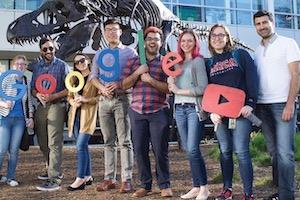Literature
New MA Degree Combines Literature, Culture, and Technology Prepares students for business, technology, media, nonprofits, and more

This fall, American University is launching an exciting, forward-looking new graduate degree: an MA in Literature, Culture, and Technology. It will combine advanced courses in literary and cultural studies, cinema, and writing with hands-on, practical courses in digital technology, such as coding.
“Our goal is to train students rigorously in the methods of the humanities (close reading, conceptual and theoretical analysis, writing, and teaching) and show them how to bring those skills to bear in the world of business, technology, media, and the nonprofit sector,” says Dustin Friedman, assistant professor of literature and co-chair of the new degree program. “The program develops the aptitudes employers say they want—communication, emotional intelligence, critical thinking, and practical knowledge of the ins-and-outs of digital technology.”
Arielle Bernstein, professorial lecturer in literature, co-chairs the program with Friedman. “Students in our classes will also explore how cultural attitudes are shaping the way we create new technologies,” she says, “and why it’s important to consider the ethical implications as we design, develop, and use everything from social media to artificial intelligence.”
Bernstein and Friedman say that career paths are plentiful, including game design, communications at a tech company, writing about the tech scene for media outlets, the teaching of writing and technical communication, or positions in the nonprofit sector or federal government that requires “translation” between tech workers and the public at large.
David Pike, chair of American University’s Department of Literature, sat down with Associate Professor Deborah C. Payne, who originated the idea for the degree, to talk about the skills it builds and the doors it can open.
Now that we’ve done it, an MA in Literature, Culture, Technology seems obvious. But even ten years ago, this combination would have seemed impossible, and there’s still nothing like it around. Where did you get the idea?
The curriculum for our MA in Literature had been designed nearly 25 years ago to meet the needs of a 1990s job market. So I asked myself what a program would look like that matches the strengths of our faculty with the skills that technologists and business leaders say they want: superb writing, the ability to extrapolate big ideas, an aptitude for close reading, the exercise of emotional intelligence, and a commitment to diversity, equity and inclusion.
How do you respond to people that claim the humanities are useless and dead?
They’re not listening to the employers or keeping up with the research. The Internet and the bookstores are full of titles such as, Why Tech Needs the Humanities. We set out to design a graduate program that puts these ideas into action. Universities have invested heavily in the digital humanities, which incorporate technology into liberal arts education, but there has been no reciprocal movement to bring the humanities to bear on the tech industry, both theoretically and professionally.
How did you put together the new lineup of courses?
We turned our scholarly expertise to scrutinize the cultures of information and technology in the way humanities academics have long scrutinized more traditional cultural and textual spheres. Our faculty devised core seminars on Cultures of Information and Technology, on Global Texts and Convergences, on Technological Imaginations: Past, Present, and Future, on Emotions, Texts, and Subtexts, on Writing and on Forms.
This sounds like an intellectual banquet. But where’s the practical part?
We combined that scrutiny with practical training in skills such as emotional intelligence, ethical reasoning, abstract thinking, cultural sensitivity, and the ability to “think outside the box” that tech employers say they need. We teamed up with colleagues in Computer Science, Data Science, and Game Design to identify MA courses in their departments suitable for our students. And we designed tracks so that you can specialize in Literature and Writing with a background in technology skills, or specialize in a tech field, coming out with a specialized certificate along with your master’s degree.
Do you need coding and programming skills before you apply?
Not at all! If you do have those skills, you’ll learn how to communicate and build with them in the worlds around the tech industry. If you don’t have them yet, you’ll learn what you need to keep up with the coders, to navigate between the various tech industries and the rest of us, and to collaborate on new projects at all levels.
Where can you get jobs with this new degree?
Even before Amazon announced its HQ2 in Arlington, the Washington DC area has a higher than average ratio of unfilled tech jobs to qualified workers. The area is full of federal Research & Development initiatives and all the jobs surrounding them. Washington is among the top cities for digital inclusivity, with women composing more than 30 percent of local the tech workforce. Bethesda Softworks is a major game studio in the Maryland suburbs. Tech firms from Deloitte and AIR to learning platforms like Everfi and LearnZillion need researchers and individuals who can analyze a wide breadth of information to provide consultant solutions.
It’s exciting that program allows our students to combine a love for literature and film with a job in tech or gaming, or wants to add cultural savvy to their tech credentials. What about a student who wants to become a writing teacher or go into publishing, with some extra tech credentials on their resume?
Instead of the tech tracks, those students could follow the track called Interdisciplinary Approaches to Literature, Culture, and Writing. This lets you focus on writing pedagogy, prepare to apply for PhD degrees, or enter publishing. We don’t do Digital Humanities, but we do give students the tools to move into DH and to think critically about print and digital cultures, about the affordances of different media, and about the long history of technology’s relationship with literature.
